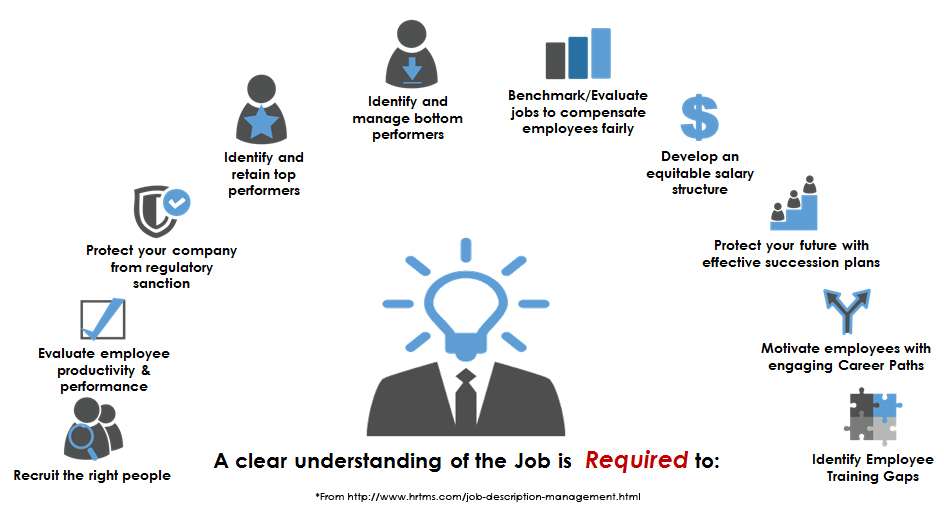Job description management

Job description management is the creation and maintenance of job descriptions within an organization. A job description is a document listing the tasks, duties, and responsibilities of a specific job. Having up-to-date, accurate and professionally written job descriptions is critical to an organization’s ability to attract qualified candidates, orient & train employees, establish job performance standards, develop compensation programs, conduct performance reviews, set goals and meet legal requirements.
Process
Prior to the development of the job description, a job analysis must be conducted. Job analysis, an integral part of HR management, is the gathering, analysis and documentation of the important facets of a job including what the employee does, the context of the job, and the requirements of the job.
Once the job analysis is complete, the job description including the job specification can be developed. A job description describes the activities to be performed and a job specification lists the knowledge, skills and abilities required to perform the job. A job description contains several sections including an identification section, a general summary, essential functions and duties, job specifications, and disclaimers and approvals.
Job descriptions are then used to develop effective EEO/ADA, HR planning, recruiting, and selection initiatives; to maintain clear continuity between compensation planning, training efforts, and performance management; and to identify job factors that may contribute to workplace safety and health and employee/labor relations.
Impact of the Internet
Job description management, as well as other facets of talent management, has been affected by the expansion of information technology. Prior to 2000, there were very few Internet-based human resource solutions available to human resource departments. HR departments often stored their printed job descriptions either in filing cabinets or Word-based job descriptions on computers or company servers. Today there are countless companies offering cloud-based talent management systems to businesses allowing HR to easily store HR information, collaborate with other departments, and access files from any device with Internet access.
Today the job description management industry includes several SaaS (Software as a Service) providers, including those that are incorporated within the recruiting tools of a holistic integrated talent management suite, as well as stand-alone products. Solutions like Halogen’s Job description Builder have enabled integration of recruiting and job description management with broader talent management activities and have empowered HR departments of all sizes to manage and verify the job descriptions for all stake holders, including employees, managers, recruiting, legal, performance management and compensation.
Leading mid-market providers of recruiting solutions that integrate with talent management include SilkRoad and Halogen Software,[2] who in 2011[3] evolved their solution to allow automation of job description building and the incorporation competencies models. While mid-market providers compete by offering their customers additional access to customer service,[4] enterprise solution providers such as SAP or Oracle, offer organizations with over 10,000 employees a solution that integrates more closely with their HRIS. Finally, stand-alone solutions include DBsquared and JDXpert by HRTMS. JDXpert, developed by HRTMS Inc., was the first stand-alone Job Description Management application that allowed organizations to separately manage their job descriptions independently from the other silos of information, while still ensuring that consistent and accurate details could be shared across the enterprise. It also allows you to manage not only the job description, but also other pertinent job-related data like: FLSA information, employee acknowledgements, compensation or salary leveling data and more.
Benefits
The benefit of having an automated cloud-based system for the maintenance and management of job descriptions include:
- Effectively collaborate between HR, department heads, managers, and subject matter experts
- Easily create, edit and maintain job descriptions
- Retain an archive of job descriptions
- Maintain up-to-date and accurate job descriptions
- Help meet legal requirements for FLSA, ADA, OSHA and Joint Commission
Legality
Well organized and up-to-date job descriptions assist in legal and regulatory compliance. The 1978 Uniform Guidelines on Employee Selection Procedure was developed in order to standardize the employee selection process and makes it clear that HR requirements must be linked with job-related factors. The Americans with Disabilities Act of 1990 (ADA) requires organizations to identify essential job functions and document the steps taken to identify job responsibilities while Fair Labor Standards Act (FLSA) requires HR managers to determine if a job is to be classified as exempt or non-exempt.
Healthcare organizations not only have to comply with labor laws but also have to comply with healthcare laws and accreditation agencies. The Joint Commission (Joint Commission on accreditation of Healthcare Organizations) accredits and certifies thousands of healthcare organizations around the United States. Their mission is "To continuously improve health care for the public, in collaboration with other stakeholders, by evaluating health care organizations and inspiring them to excel in providing safe and effective care of the highest quality and value". To meet Joint Commission guidelines, healthcare organizations must maintain up-to-date, accurate, complete and properly written job descriptions.
The above regulations require businesses to keep clear records of their job descriptions. Having a well-organized automated system helps eliminate some of the panic associated with a compliance audit.
References
Mathis, Robert L., and John H. Jackson. Human Resource Management. 11th ed. Mason: Thomson South-Western, 2006. 175-87. Print.
Guide To Writing Job Descriptions. UCLA, n.d. Web. 13 Dec. 2011. <http://www.college.ucla.edu/personnel/jobdesc/intro.asp>.
The Fair Labor Standards Act. United States Department of Labor, n.d. Web. 13 Dec. 2011. <http://www.dol.gov/compliance/laws/comp-flsa.htm>.
About The Joint Commission. The Joint Commission, 2011. Web. 13 Dec. 2011. <http://www.jointcommission.org/about_us/about_the_joint_commission_main.aspx>.
HRTMS About. HRTMS, 2016. Web. 4 Apr. 2016. <http://www.hrtms.com/about.html>.